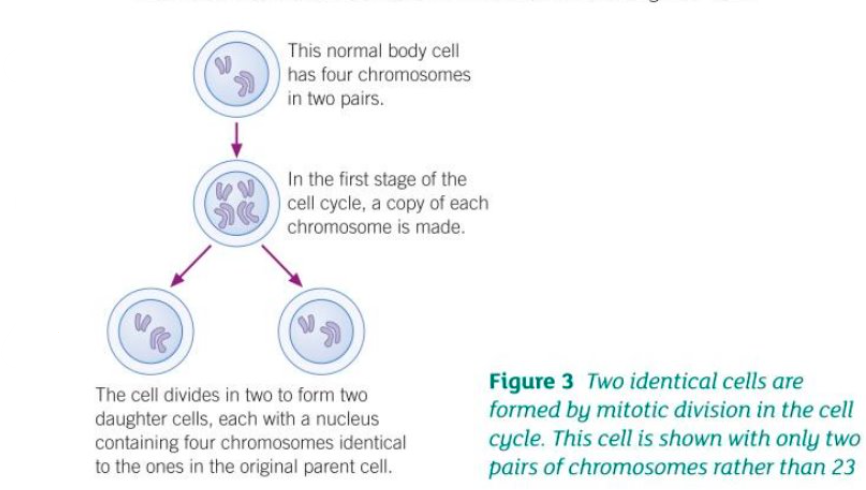
2.1 Cell Division
Cell division: the formation of two identical daughter cells.
Information inside cells:
Each cell has a nucleus that contains chromosomes. These carry genes (a short section of DNA carrying genetic information). Chromosomes are found in pairs (one inherited from the father, one inherited from the mother). 23 pairs of chromosomes are found in the nuclei of (most) cells.
The cell cycle:
Cell cycle: the series of stages in which body cells divide. It consists of three stages:
STAGE 1:
The longest stage in the cell cycle.
Cells grow bigger, increase their mass and carry out normal cell activities.
They replicate their DNA to form two copies of each chromosome ready for cell division.
They also increase the number of/synthesise new sub-cellular structures (ie: mitochondria, ribosomes, chloroplasts).
STAGE 2 (mitosis):
One set of chromosomes is pulled to each end of the dividing cell.
The nucleus divides.
STAGE 3:
The cytoplasm and cell membranes also divide to form two identical daughter cells.

Mitotic cell division is needed for growth, repair and development in multicellular organisms.
2.1 Cell Division
Cell division: the formation of two identical daughter cells.
Information inside cells:
Each cell has a nucleus that contains chromosomes. These carry genes (a short section of DNA carrying genetic information). Chromosomes are found in pairs (one inherited from the father, one inherited from the mother). 23 pairs of chromosomes are found in the nuclei of (most) cells.
The cell cycle:
Cell cycle: the series of stages in which body cells divide. It consists of three stages:
STAGE 1:
The longest stage in the cell cycle.
Cells grow bigger, increase their mass and carry out normal cell activities.
They replicate their DNA to form two copies of each chromosome ready for cell division.
They also increase the number of/synthesise new sub-cellular structures (ie: mitochondria, ribosomes, chloroplasts).
STAGE 2 (mitosis):
One set of chromosomes is pulled to each end of the dividing cell.
The nucleus divides.
STAGE 3:
The cytoplasm and cell membranes also divide to form two identical daughter cells.

Mitotic cell division is needed for growth, repair and development in multicellular organisms.
 Knowt
Knowt